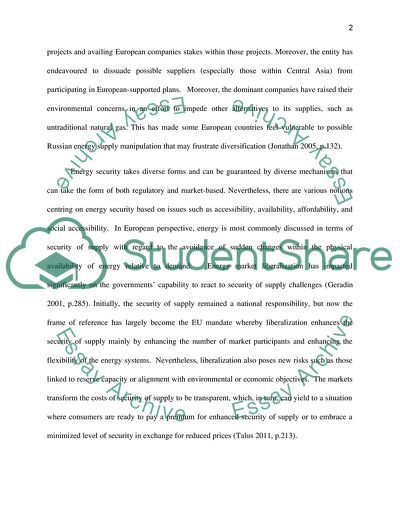Cite this document
(“Europe & Russia Essay Example | Topics and Well Written Essays - 2000 words”, n.d.)
Europe & Russia Essay Example | Topics and Well Written Essays - 2000 words. Retrieved from https://studentshare.org/social-science/1620333-briefly-explain-the-ways-in-which-a-large-supplier-of-gas-into-the-eu-such-as-gazprom-or-sonatrach-could-threaten-the-stability-of-energy-supplies-or-distort-a-competitive-market-within-the-union-explain-how-eu-law-and-regulation-seek-to-address-the
Europe & Russia Essay Example | Topics and Well Written Essays - 2000 words. Retrieved from https://studentshare.org/social-science/1620333-briefly-explain-the-ways-in-which-a-large-supplier-of-gas-into-the-eu-such-as-gazprom-or-sonatrach-could-threaten-the-stability-of-energy-supplies-or-distort-a-competitive-market-within-the-union-explain-how-eu-law-and-regulation-seek-to-address-the
(Europe & Russia Essay Example | Topics and Well Written Essays - 2000 Words)
Europe & Russia Essay Example | Topics and Well Written Essays - 2000 Words. https://studentshare.org/social-science/1620333-briefly-explain-the-ways-in-which-a-large-supplier-of-gas-into-the-eu-such-as-gazprom-or-sonatrach-could-threaten-the-stability-of-energy-supplies-or-distort-a-competitive-market-within-the-union-explain-how-eu-law-and-regulation-seek-to-address-the.
Europe & Russia Essay Example | Topics and Well Written Essays - 2000 Words. https://studentshare.org/social-science/1620333-briefly-explain-the-ways-in-which-a-large-supplier-of-gas-into-the-eu-such-as-gazprom-or-sonatrach-could-threaten-the-stability-of-energy-supplies-or-distort-a-competitive-market-within-the-union-explain-how-eu-law-and-regulation-seek-to-address-the.
“Europe & Russia Essay Example | Topics and Well Written Essays - 2000 Words”, n.d. https://studentshare.org/social-science/1620333-briefly-explain-the-ways-in-which-a-large-supplier-of-gas-into-the-eu-such-as-gazprom-or-sonatrach-could-threaten-the-stability-of-energy-supplies-or-distort-a-competitive-market-within-the-union-explain-how-eu-law-and-regulation-seek-to-address-the.


